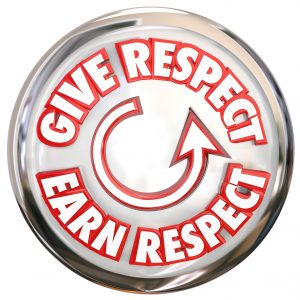
Teach Respect and Give Respect
I am always disappointed when I read snarky, rude responses and comments on social media sites. I think it is bad form and unprofessional. There are ways to comment and disagree without vulgar language and insulting tirades. The old maxim, “if you can’t say something nice, don’t say anything at all,” is worth considering before you post a response that is public and has the power to come back and bite you. But there is nothing more distressing for me, as an etiquette and protocol consultant, than to see this bad behavior coming from other people who consider themselves professionals in our industry.
I have noticed over the past months, with the increase in organized groups on LinkedIn for etiquette trainers that there is a distinct lack of civility in responses from some who comment in some of those groups; something I think is quite distressing, especially for people who are suppose to be teaching others how to be more civilized.
Certainly, not all of the responders are to blame, but I do have trouble with other etiquette trainers calling people out in a rude fashion who have posted something they don’t agree with, especially when it is some point of minutia.
Since the rules of etiquette are suppose to be rooted in consideration for others, I find it difficult to tolerate those who would berate someone because they don’t agree with where they put the napkin when they leave the table temporarily. It is the kind of thing that gives etiquette trainers a bad name- suggesting that we focus on the rule and not the reason behind it. I think those of us who were well trained by reputable organizations, can agree to disagree, on a few points based on where we live and the cultures in which we teach. There are differences to be sure.
When I teach dining etiquette to any group I often say,”if you used the right fork, but were rude to the wait staff, you’ve missed my message.” It’s not about the fork!
So, here are some of my tips for people in our industry to make us more civilized and diplomatic:
-
Disagree diplomatically anytime, but especially on social media.
-
Be happy for other people’s successes in our industry.
-
Make friends with your competition. There is enough business out there for all of us.
-
If people share your info on social media, share theirs in return.
-
Find out who’s out there doing what you do. Networking is a good thing in any arena.
-
Give credit where credit is due.
But most of all, practice what we preach. Let’s get over ourselves, stop the pretense and exhibit some civility toward one another. If you can’t and don’t, I question whether you should call yourself a professional and whether you should align yourself with some of the other fine people out there doing some great things in our industry.
As for me commenting and joining those groups, I have stopped joining them and commenting…not because I don’t admire some of the people who have started the groups, but because I don’t want to be associated with some of those who comment in a way that I don’t admire.
Today, starts the beginning of National Etiquette Week so, let’s all get on board and demonstrate what we say we are all about.









Kudos Karen! Well said. Like you, I have been saddened and dismayed by lack of courtesy by some in a business that promotes courtesy.
We won’t always agree with the opinion of another but there is a diplomatic way to disagree. Some differences are based in culture or region. It doesn’t make it wrong, only different.
Lead by example.
Thank you, Suzanne. I always appreciate your support and point of view.
WELL SAID!
Karen, Thanks for speaking up about this – those of us who work the etiquette and protocol industry have an opportunity to elevate discussions and, practice what we preach. This is the challenge.
Thank you for commenting, Mimi. I appreciate your input.